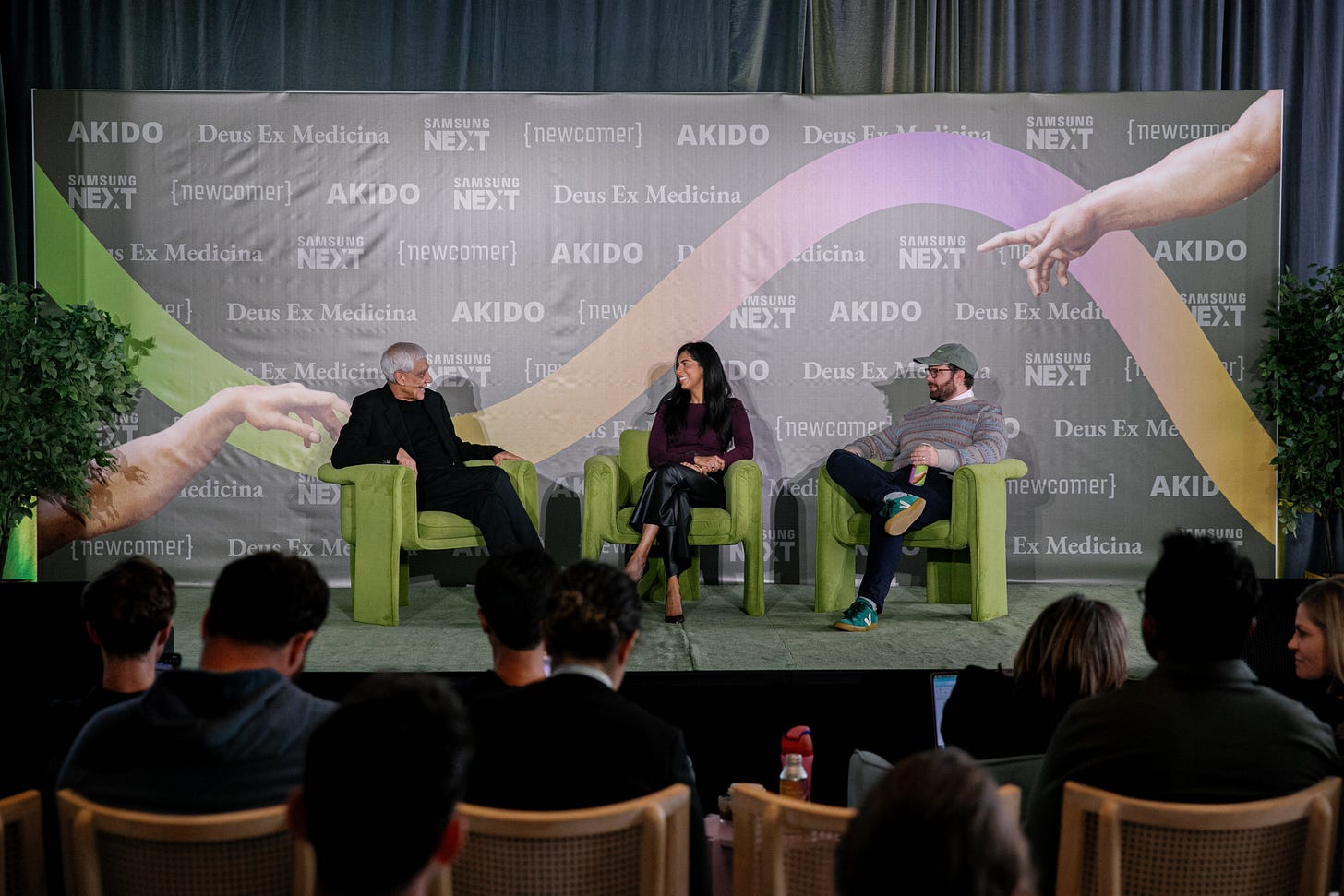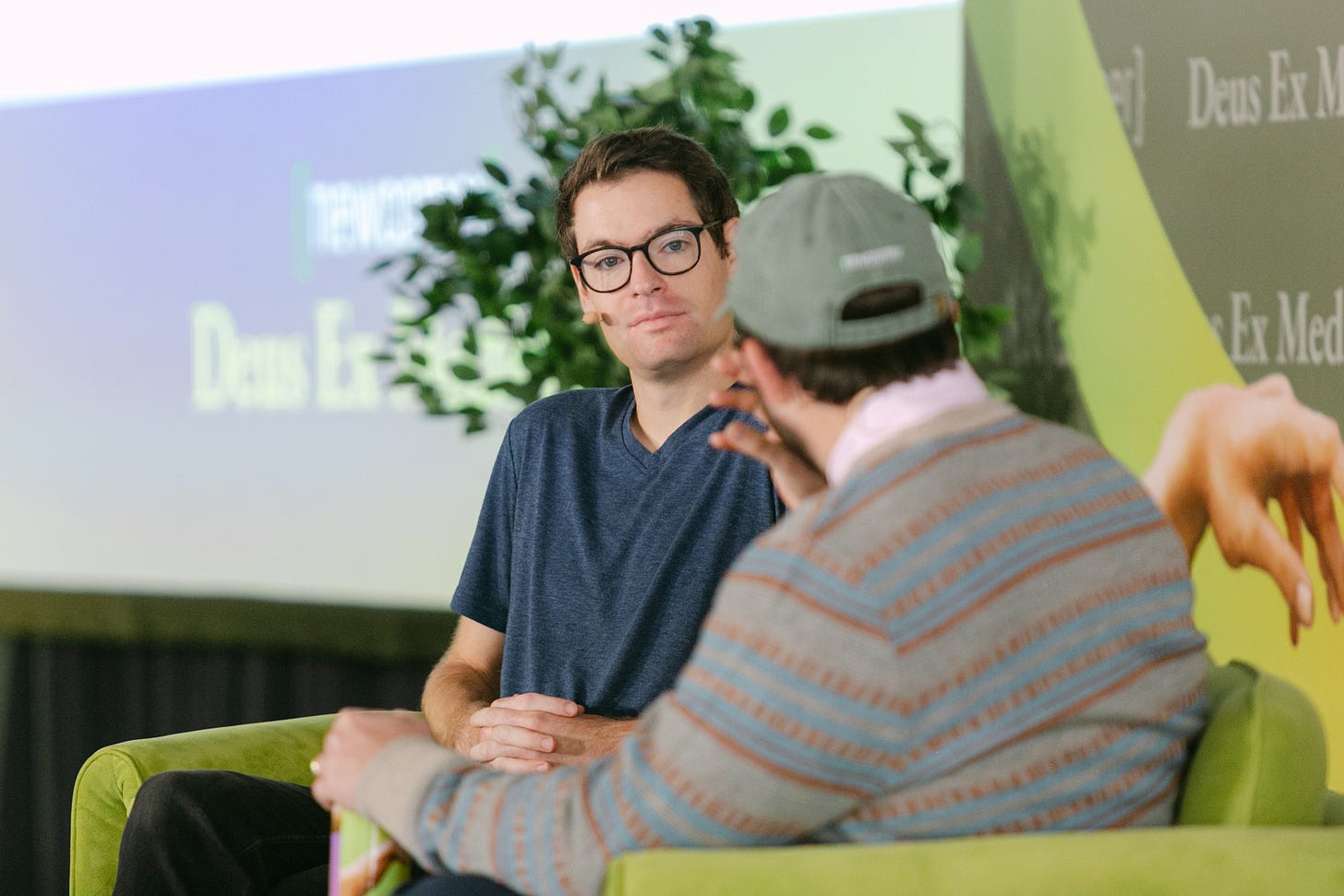AI in Healthcare Seeds Big Dreams, Shadowed by Politics & Tight-Fisted Payers
Our top takeaways from Deus Ex Medicina
If anyone doubted the sincerity of Vinod Khosla’s fervent belief in AI as a healthcare solution, the 70-year-old investor said Tuesday that he asks ChatGPT first when he has a medical question — and if his doctor disagrees, he asks another doctor.
Khosla, the first venture investor in OpenAI, is well-known for his bullishness on AI, and he did not disappoint in his appearance at our Deus Ex Medicina health and longevity conference in San Francisco. “Assume AI will be smarter than humans in every area,” he advised. If it weren’t for the intransigence of the American Medical Association, Khosla said, we’d be well on our way to fleets of AI doctors diagnosing diseases and prescribing treatments.
Yet most of the speakers on Tuesday had a more nuanced view, painting a picture of a sprawling and often dysfunctional industry with a wide range of needs — and thus a lot of targets for AI healthcare startups. Bringing innovation to the complex and highly regulated healthcare world can be a painstaking process, and more than one speaker pined for being able to start an AI-based medical system from scratch.
Here are a few more headlines from the day, with further details on the discussions below.
China was on a lot of peoples’ minds, and there was more than a little envy of the country’s quick drug approval process and openness to innovation.
There weren’t a lot of RFK Jr. fans in the room, with Khosla and others denouncing the HHS Secretary’s anti-vaccine stance. Khosla gave him a grade of “less than F.”
Founders were confident that OpenAI and the other big LLM companies won’t be focused enough to execute on niche healthcare applications. “Certain people are running around the world saying one ring will rule them all and it’s just not true,” said Munjal Shah of Hippocratic AI, in a not-very-veiled reference to Sam Altman.
When it comes to genomics and drug discovery, AI can accelerate the research and clinical trial processes and point to new uses of the data, though it doesn’t have immediate impact on the core biology work.
Despite Khosla’s views, most of the speakers touted the importance of keeping doctors at the center of healthcare delivery. “Healthcare is about people,” stressed Shiv Rao of Abridge, in the day’s final session. Conversations between patients and providers “continue to be a core signal,” he said.
The event took place on Tuesday and was emceed by Eric Newcomer and Smart Girl Dumb Questions host Nayeema Raza. Newcomer’s next event, the Cerebral Valley AI Summit, will take place in San Francisco on November 12.
Optimism All Around
Almost everyone in the crowd of health tech investors and founders was bullish on what AI would bring to healthcare; a show of hands revealed barely a skeptic in the room, which could be read as a sign of over-exuberance, or worse.
Still, some of the early results of AI in healthcare do look impressive.
Shah said that Hippocratic AI, which uses voice agents to help people manage chronic conditions, had called 200,000 people during a recent East Coast heatwave to check on their vulnerability to heat stroke. Prashant Samant of Akido Labs, which operates a full-stack health system in southern California, said the company’s iPad-based AI diagnostic screening and other tools had increased physician productivity by 400%.
Daniel Cahn of Slingshot AI, which is building its own LLM for mental health, said a beta test with 50,000 people showed results comparable to human therapists.
AI tools can not only speed drug development, they can also find hidden gems among molecules that didn’t make it to FDA trials, or were abandoned at an early stage. “I think the old, larger biopharmaceutical companies are sitting on troves and troves of data that they couldn’t really do anything with before,” said Benchling CEO Sajith Wickramasekara. But even with progress on the discovery side, the arduous drug approval process has led America to cede its lead in biotech development to China.
Formation Bio is focused specifically on the hurdle posed by the cost of clinical trials; the company uses AI to identify and acquire drug candidates that have made it through the first stage, and then speeds the stage-two trials by automating the administrative protocols. Founder Ben Liu said the approach can slash the time it takes to bring a promising drug to market.
Business models were a big topic of the day, since in healthcare the “customer”— or patient — is usually not the one paying the bills, and getting the payers (i.e. insurance companies) to underwrite innovative solutions is notoriously tough. Zachary Ziegler outlined how OpenEvidence, an LLM developed specifically for doctors, had decided to offer it for free, with an ad-supported model. It’s certainly a much quicker route than trying to persuade hospitals and doctors, and ultimately the insurers, to pay for it.
There was cautious optimism that a regulatory overhaul in Washington would lead to better business outcomes, despite RFK Jr.’s anti-science stance. Oura CEO Tom Hale praised the Trump administration’s new “Kill the Clipboard” initiative, which aims to digitize all doctor paperwork and build pathways for patients to share health information with their providers.
Oak HC/FT’s Annie Lamont said the Trump Administration has been more constructive than its predecessor when it comes to technology’s role in streamlining patient care. Venrock partner Bob Kocher supported the recent push to overhaul the Medicare Advantage star rating system to allow for more private sector innovation, though solving the insurance company profiteering that has plagued Medicare Advantage remains a huge issue.






